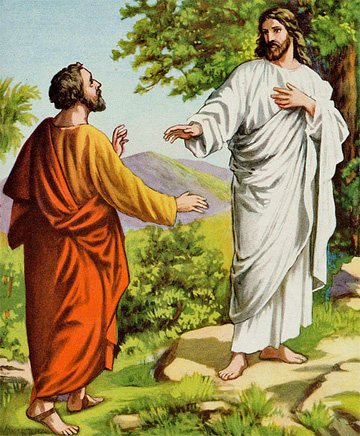In yesterday’s post I showed how Jesus startled his disciples by claiming that he, as the Son of Man, would suffer and die. Though Jewish visions of the Son of Man pictured him as receiving honor and glory, Jesus said that he, as the Son of Man, had come “not to be served but to serve, and to give his life a ransom for man” (Mark 10:45). I closed yesterday’s post by wondering where Jesus got these unprecedented ideas:
Nothing in the disciples’ Jewish background had prepared them for this astounding claim concerning the mission of the Son of Man. Nowhere in Jewish thought prior to Jesus was the Son of Man envisioned as a servant who surrenders his own life for others. Where in the world did Jesus get this idea? Was it a brand new thought, a novel bit of special revelation? Or was Jesus drawing from some element of Jewish tradition that was not usually associated with the Son of Man?
The last option is the correct one. Jesus framed his mission as the Son of Man by combining Daniel’s fantastic dreams with Isaiah’s poignant portrait of the suffering Servant of God. In the so-called Servant Songs found in chapters 42-53 of the Isaiah, God speaks of his chosen servant, the one in whom his soul delights: “I have put my spirit upon him; he will bring forth justice to the nations” (Isa 42:1). Beyond reestablishing the kingdom of God in Israel, the Servant will extend God’s salvation “to the end of the earth” (Isa 49:6).
In chapter 52, Isaiah’s description of the Servant seems at first to fulfill Jewish expectations for the one who will inaugurate God’s reign: “See, my servant shall prosper; he shall be exalted and lifted up” (Isa 52:13). But then Isaiah’s picture of the Servant takes a staggering turn. Many are “astonished” at him because “so marred was his appearance, beyond human semblance” (Isa 52:14). Not only does he lack any sign of glory, but also he is so battered that people hide their eyes rather than look at him. The Servant’s shocking suffering is not in vain, however, because he agonizes for the sake of others:
Surely he has borne our infirmities and carried our diseases; yet we accounted him stricken, struck down by God, and afflicted. But he was wounded for our transgressions, crushed for our iniquities; upon him was the punishment that made us whole, and by his bruises we are healed (Isa 53:4-5).
God’s Servant even “pours out himself to death,” giving up his life as “an offering for sin” (Isa 53:10-12). (Photo: “Crucifixion at Barton Creek Mall” by James Janknegt, 1985.)
Jesus appropriated these images when speaking of himself as the Son of Man who “came not to be served but to serve, and to give his life a ransom for many” (Mark 10:45). Through the “ransom” paid by his suffering and death, he would set many free from their captivity, just like God’s Servant who took upon himself “the punishment that made us whole” (Isa 53:5). As the Servant “poured out himself to death” for the sake of others, Jesus would soon “pour out” his blood for many for the forgiveness of sins” (Matt 26:28).
Jesus interwove the unsettling picture of the Servant of God in Isaiah with Daniel’s mysterious vision of the Son of Man. In this extraordinary tapestry, he combined Jewish hopes for God’s glorious salvation with divine promises of the Servant’s vicarious suffering. The Son of Man will be glorified, Jesus said, but not as you have expected, at least not at first. He will be lifted up, as you have hoped, but not initially into the heavens. Rather, the Son of Man as Servant of God will be lifted up on the cross, and, paradoxically, from there he will draw the whole world to himself (John 12:32-33). He will be glorified through a most inglorious death. Yet his sacrifice will be the source of life for others, the ultimate act of servanthood, the ransom for many.
Thus, through his suffering, Jesus fulfilled his destiny as the Son of Man. By dying on the cross, he bore the sin of many, thus becoming the Savior, not only of Israel, but also of all humanity. In his saving work, as we have seen earlier in this series, Jesus did what God alone could do. Therefore, his followers began to see him as more than a human being. Moreover, because of his faithfulness as the suffering Son of Man, Jesus was believed to inherit the rewards reserved for the victorious Son of Man in Daniel 7: “To him was given dominion and glory and kingship, that all peoples, nations, and languages should serve him” (Dan 7:14; see Phil 2:5-11).
In my next post in this series I’ll look at one additional piece of evidence from the gospels, verses where Jesus speaks of himself as God’s son in a curious and telling manner.

